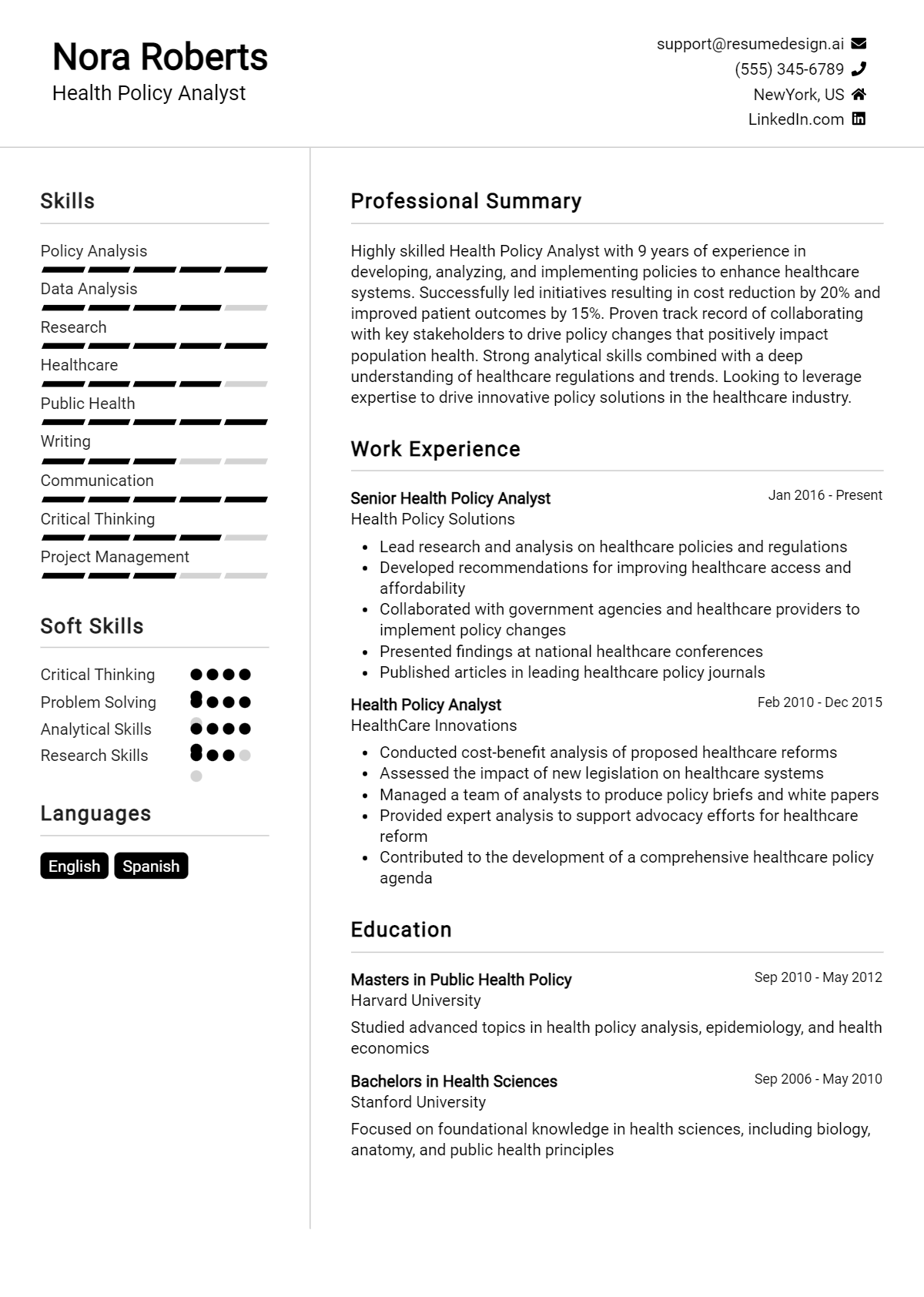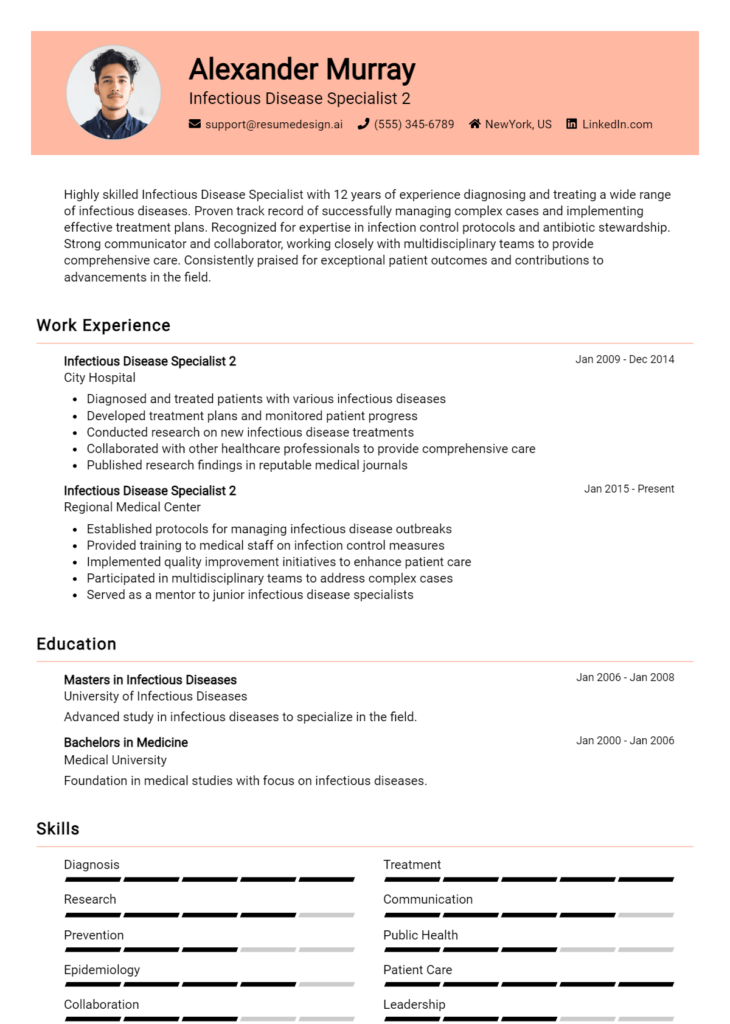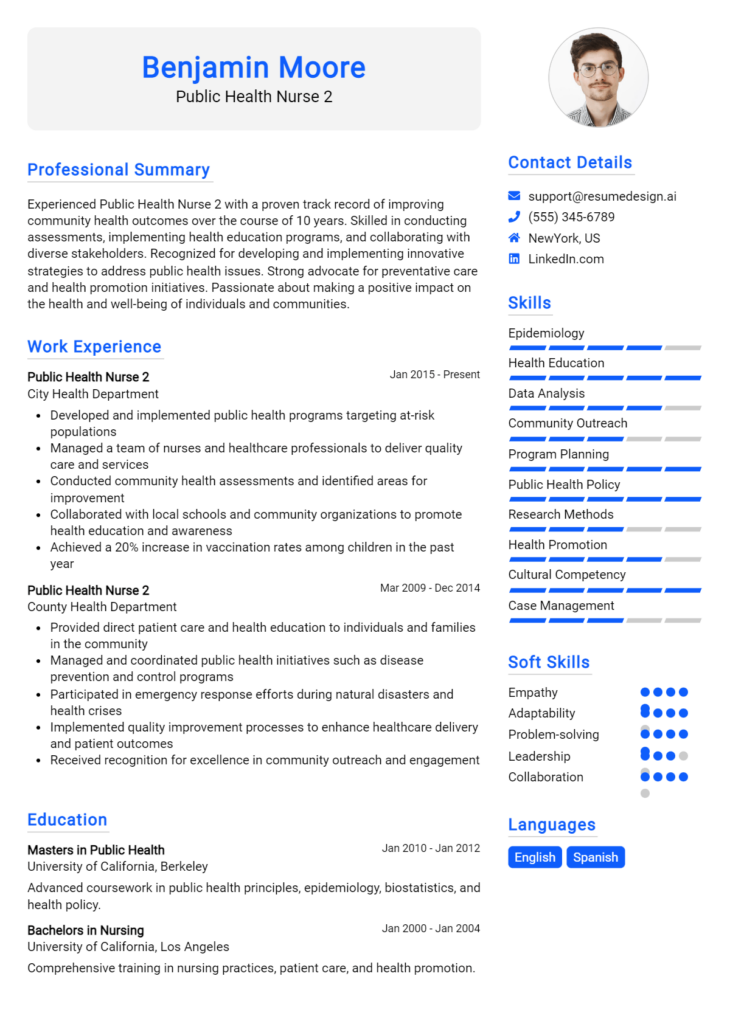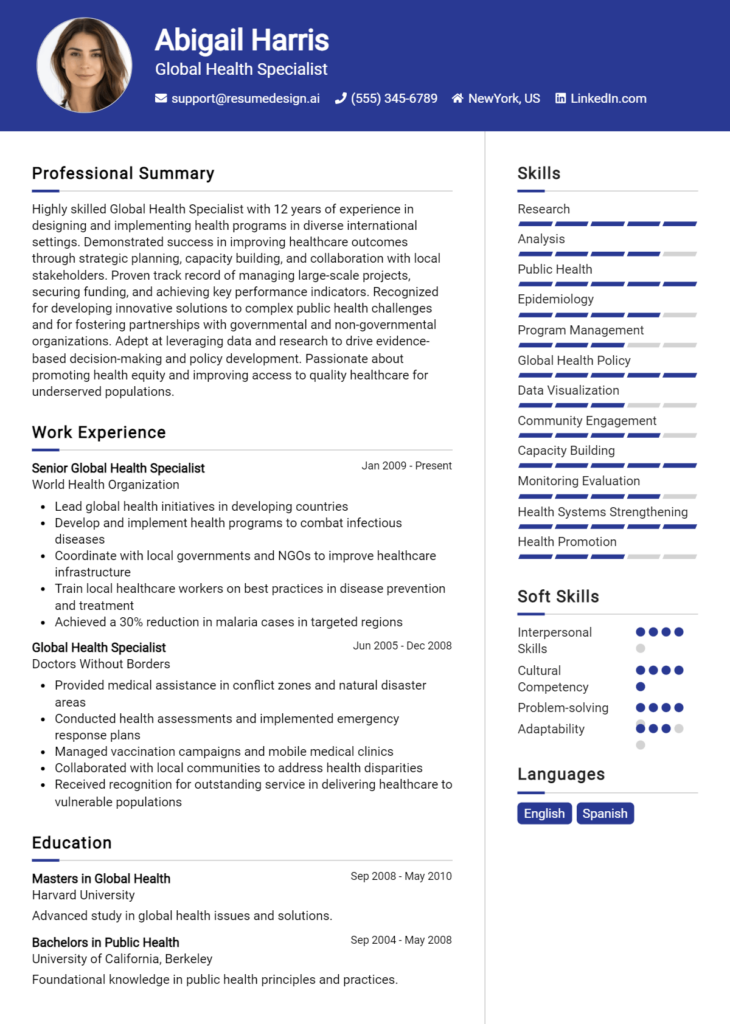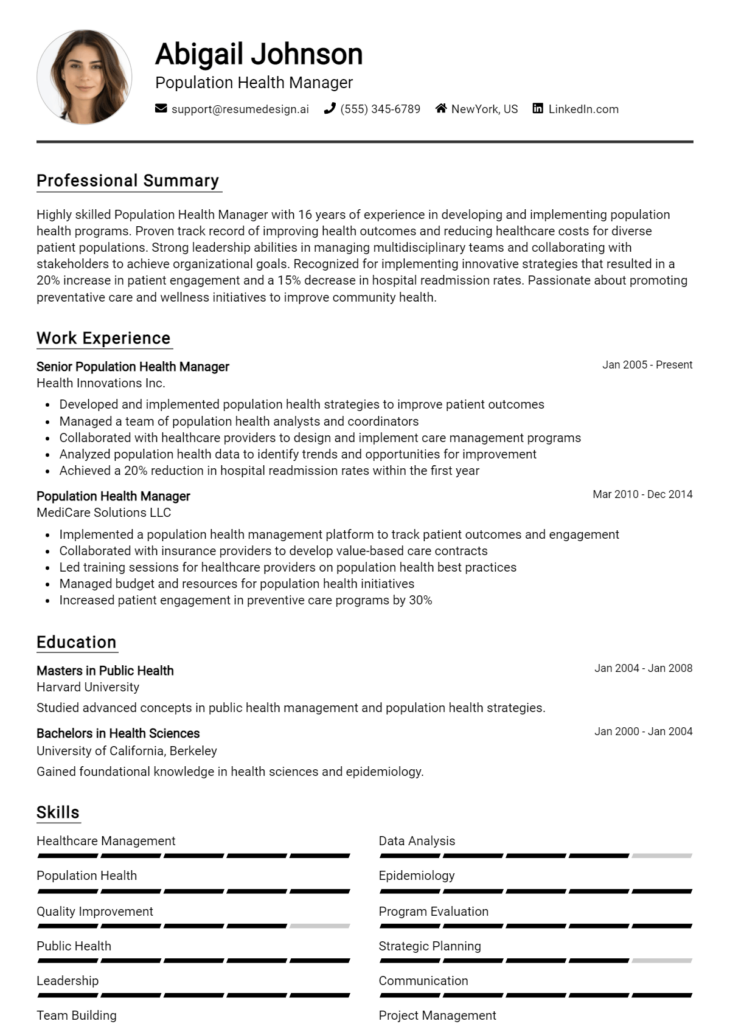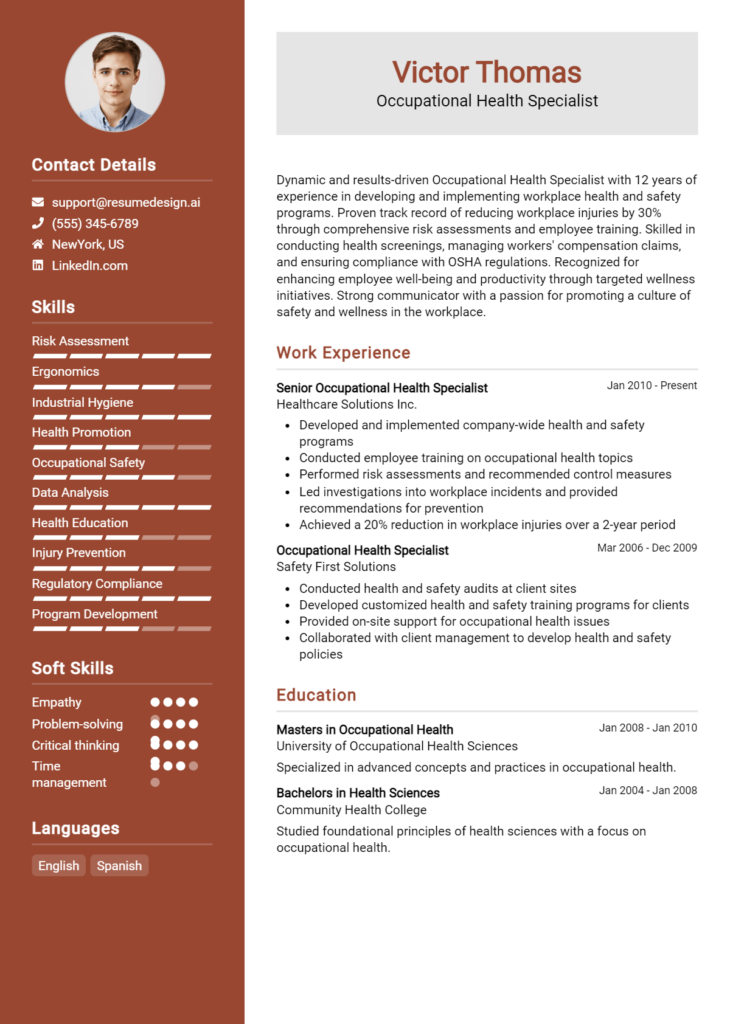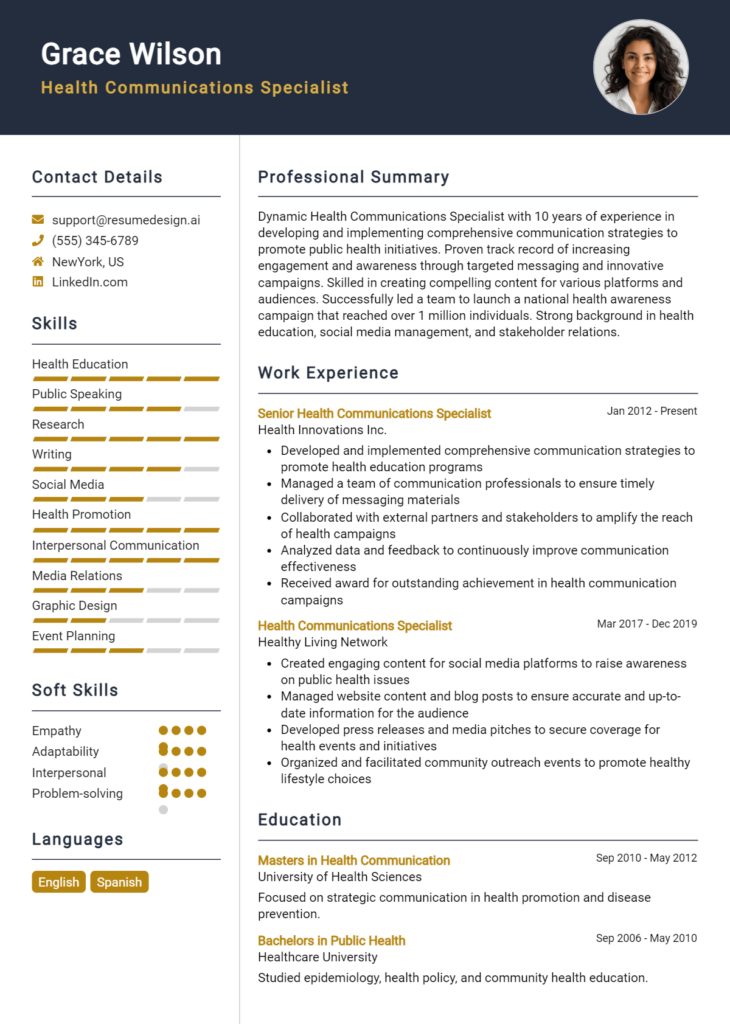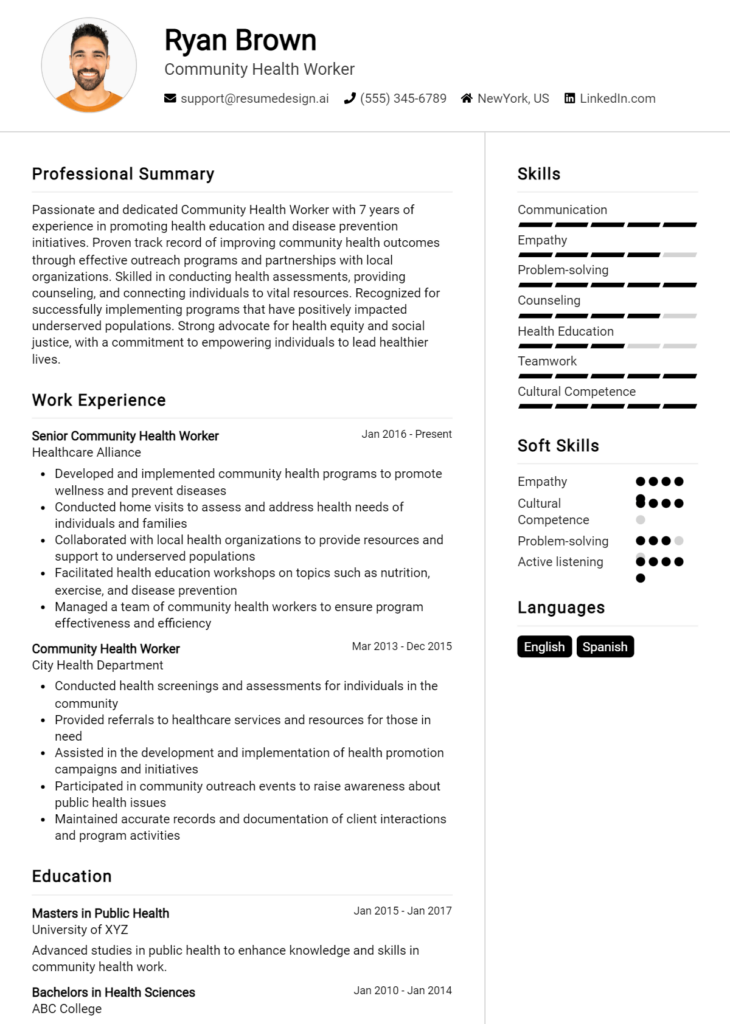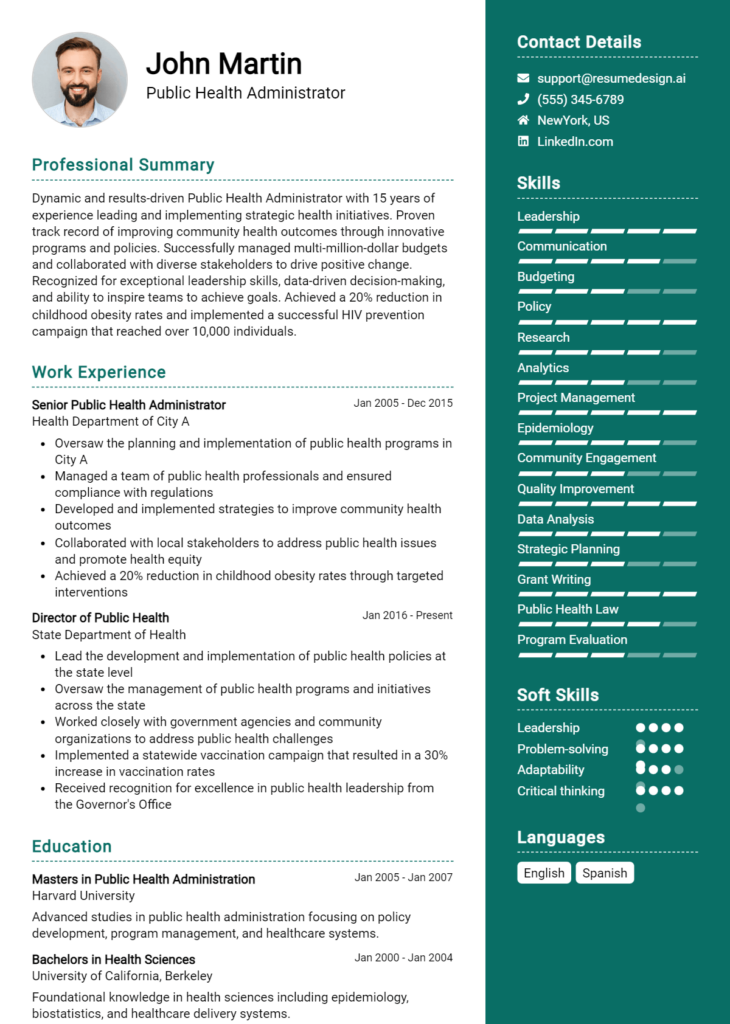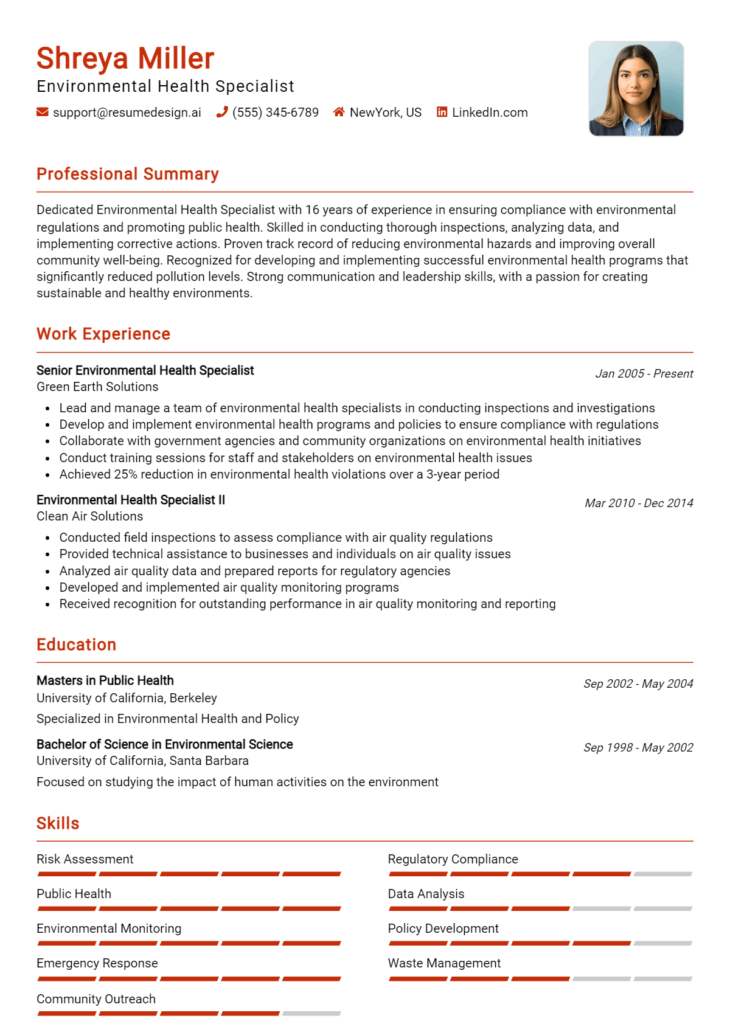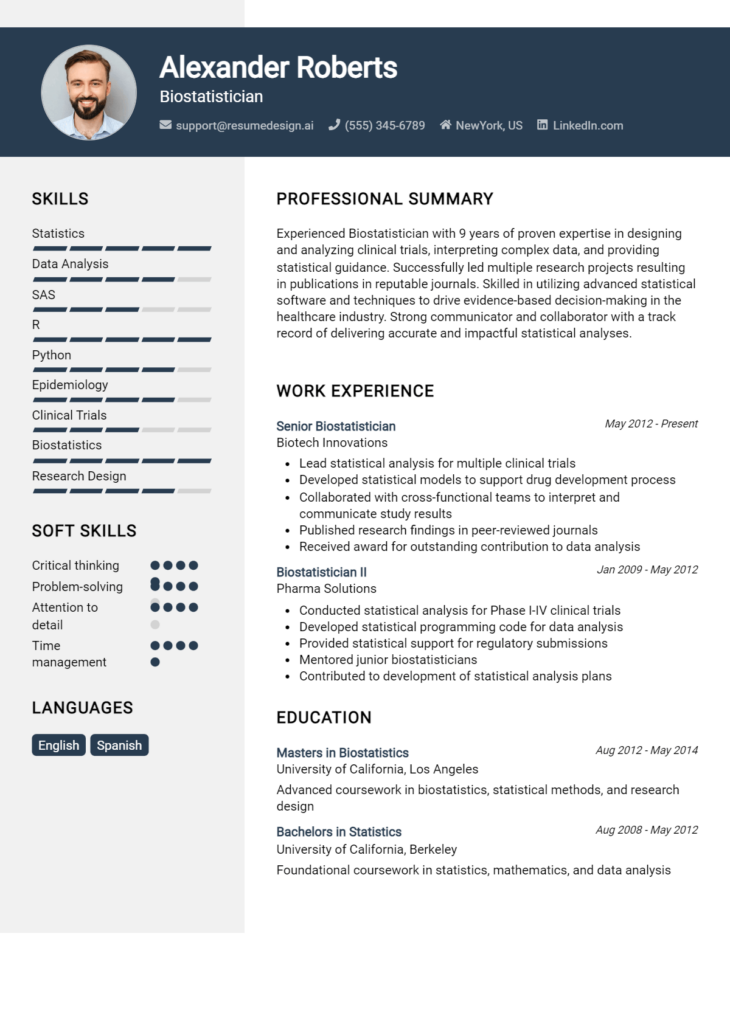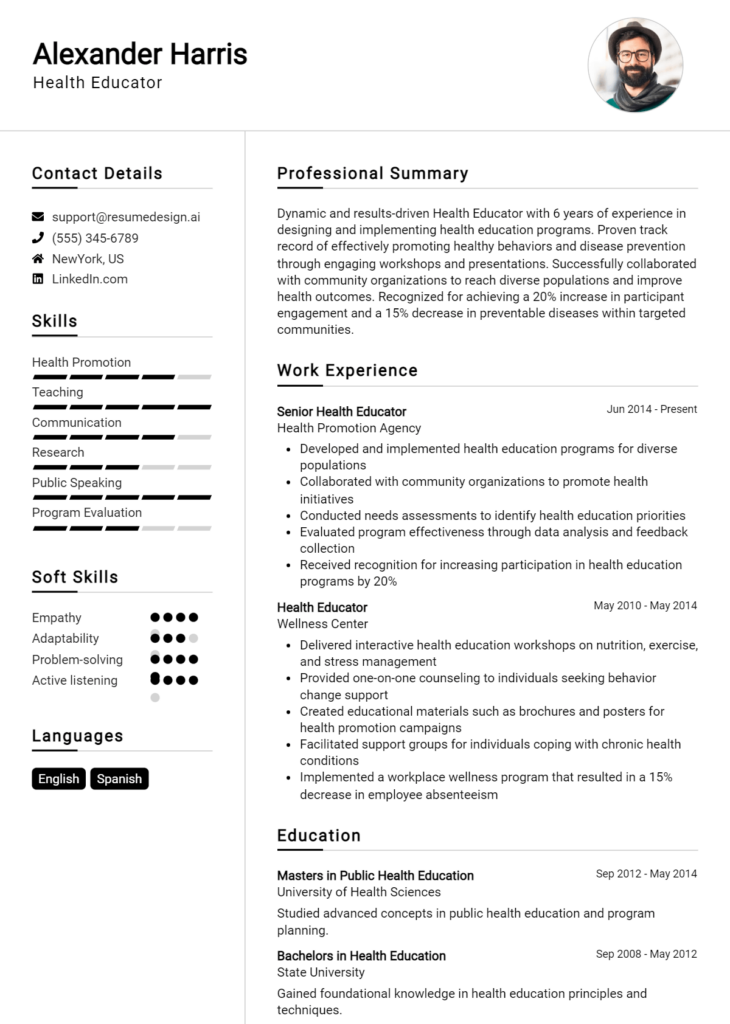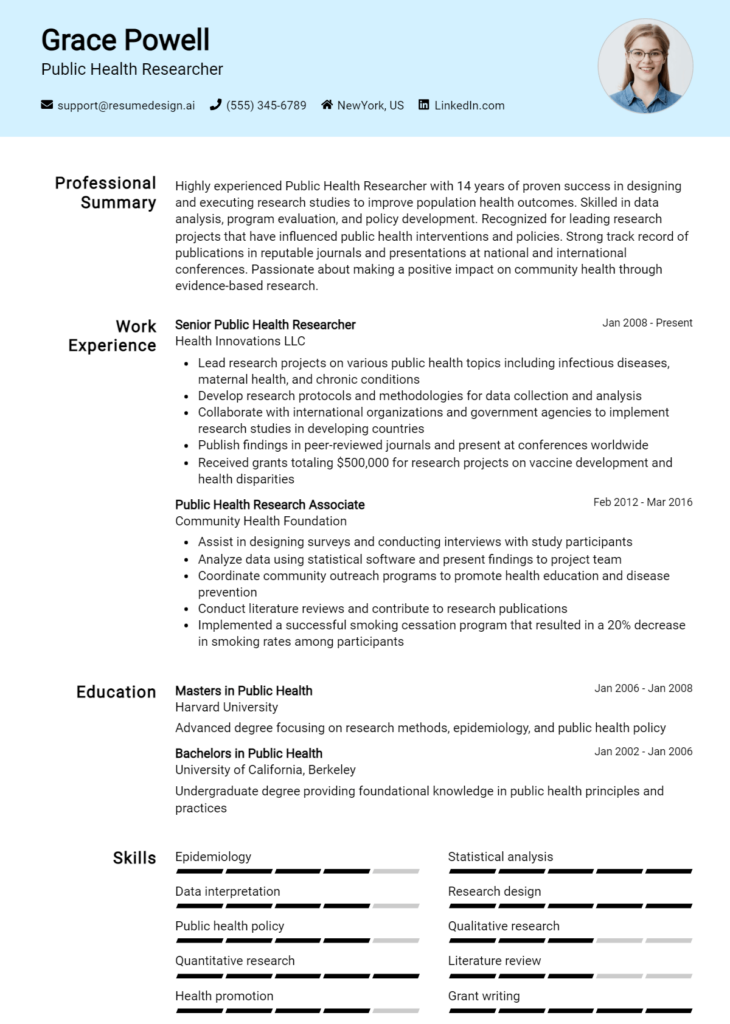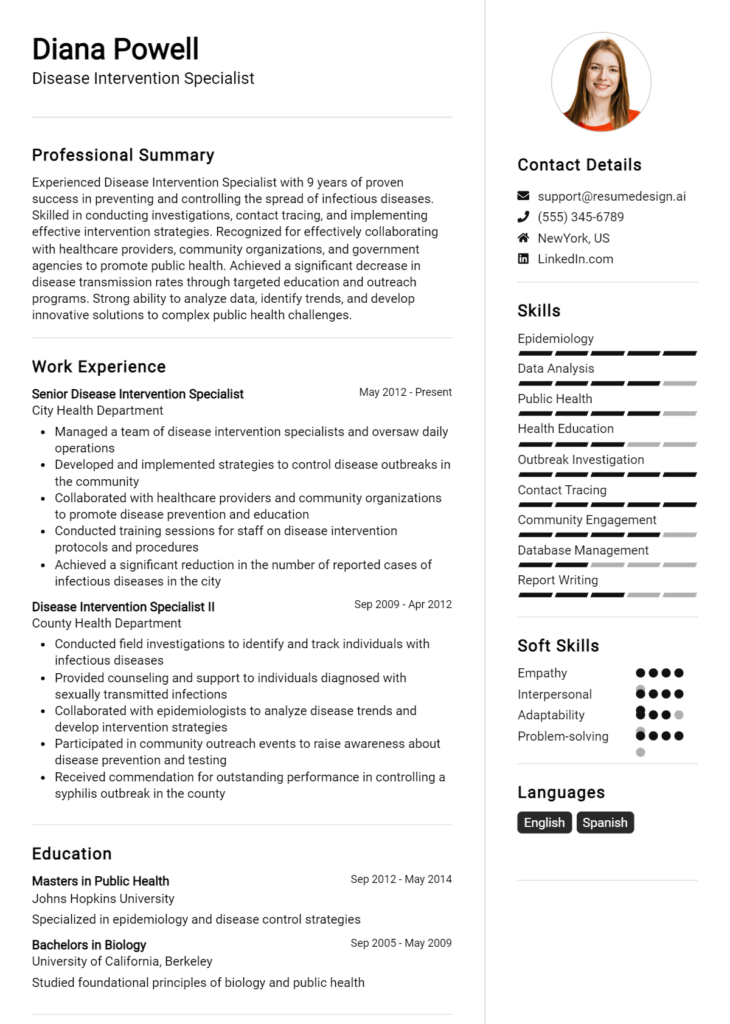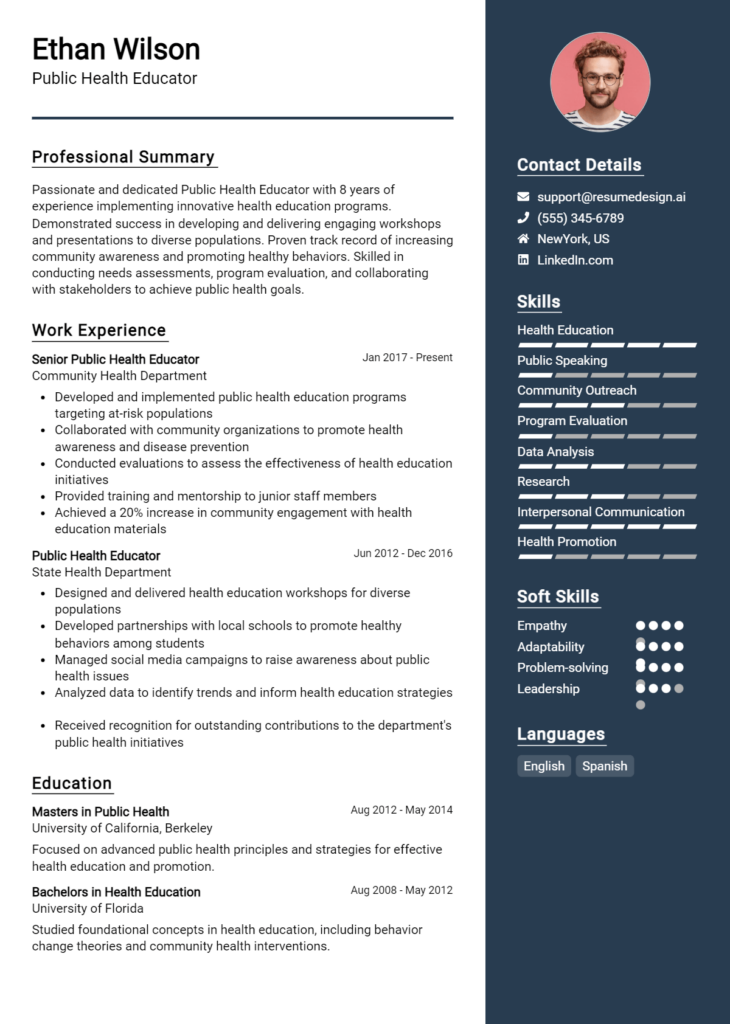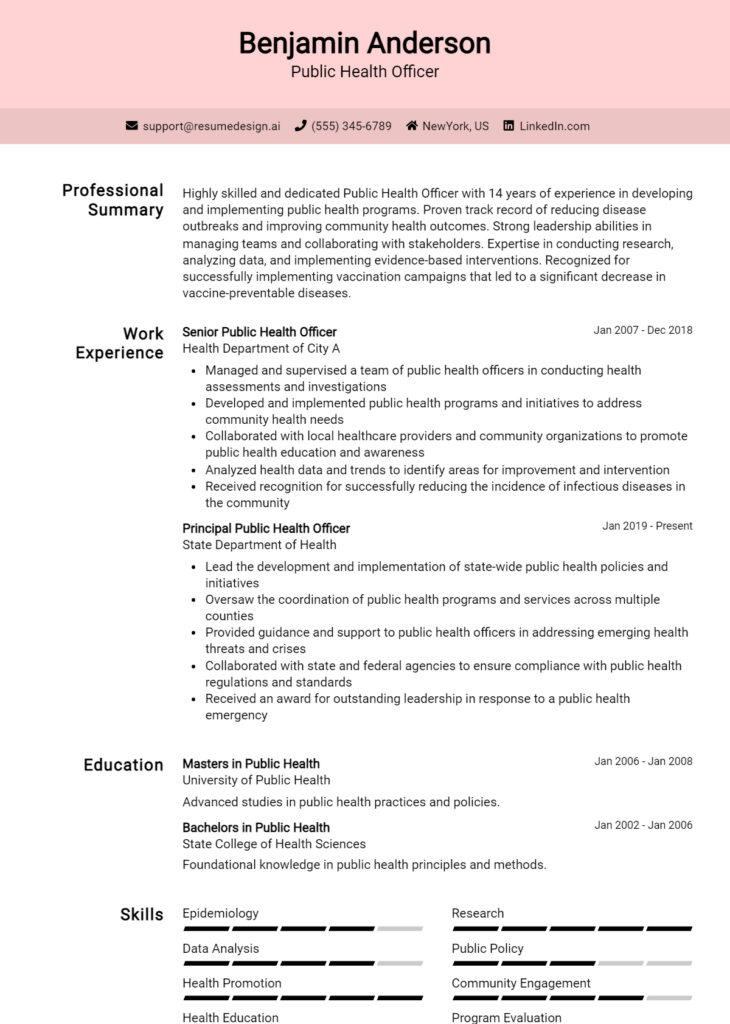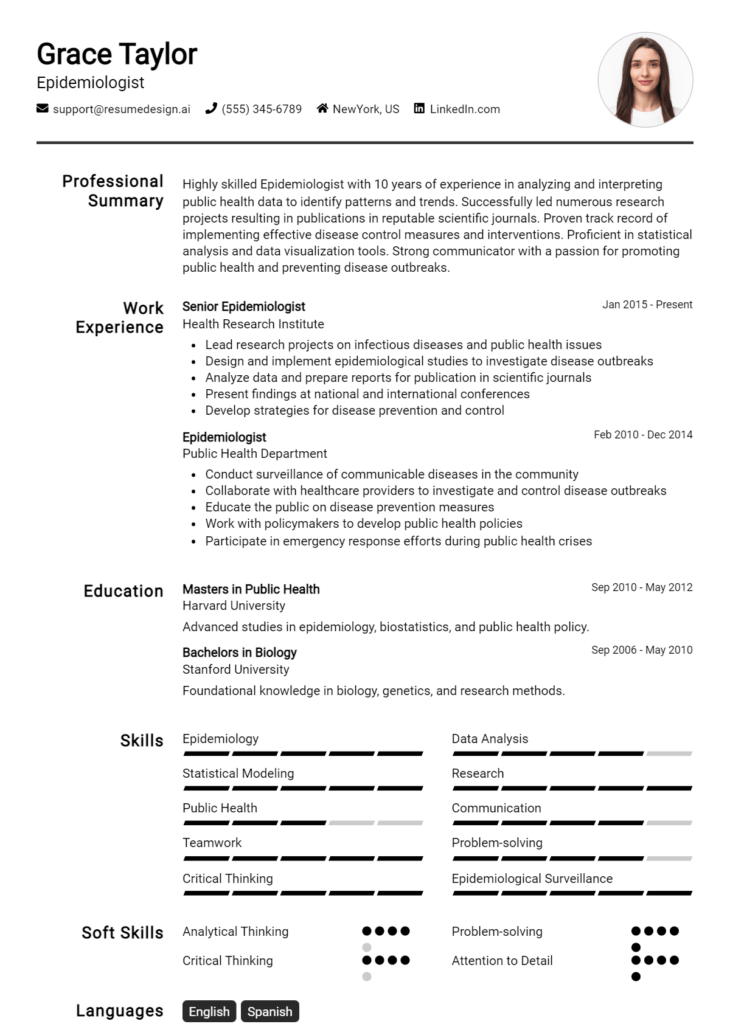Health Policy Analyst Core Responsibilities
A Health Policy Analyst plays a crucial role in bridging the gap between various departments such as healthcare, finance, and regulatory affairs. Key responsibilities include analyzing health policies, conducting research, and advising stakeholders on policy implications. Essential skills encompass technical knowledge, operational management, and strong problem-solving abilities, which collectively contribute to achieving the organization's objectives. A well-structured resume highlighting these qualifications is vital for demonstrating expertise and enhancing employability in this competitive field.
Common Responsibilities Listed on Health Policy Analyst Resume
- Conducting comprehensive research and analysis of healthcare policies
- Evaluating the economic and social impacts of health policies
- Collaborating with government agencies and healthcare organizations
- Preparing detailed reports and policy briefs for stakeholders
- Monitoring legislative developments and regulatory changes
- Designing and implementing policy assessments and evaluations
- Providing recommendations to improve healthcare delivery systems
- Engaging in advocacy efforts to promote effective health policies
- Facilitating discussions among diverse stakeholders
- Utilizing statistical software and data analysis techniques
- Presenting findings and insights at conferences and meetings
High-Level Resume Tips for Health Policy Analyst Professionals
In the competitive field of health policy analysis, a well-crafted resume is crucial for making a strong first impression on potential employers. Your resume serves as a marketing tool that should effectively showcase your unique skills, relevant experience, and notable achievements in the health policy arena. As it is often the first point of contact between you and a hiring manager, it is essential that your resume not only reflects your qualifications but also resonates with the specific needs of the role you are applying for. This guide will provide practical and actionable tips tailored specifically for Health Policy Analyst professionals, helping you to stand out in a crowded job market.
Top Resume Tips for Health Policy Analyst Professionals
- Customize your resume for each job application by aligning your skills and experiences with the specific job description.
- Highlight relevant work experience in health policy, research, or data analysis, using industry-specific terminology.
- Quantify your achievements with concrete metrics, such as improved health outcomes or cost savings achieved through your analysis.
- Include key skills that are pertinent to the role, such as statistical analysis, policy evaluation, and stakeholder engagement.
- Showcase any relevant certifications or advanced degrees that enhance your credibility in the health policy field.
- Utilize a clear and professional format, ensuring your resume is easy to read and visually appealing.
- Incorporate keywords from the job posting to pass Applicant Tracking Systems (ATS) and demonstrate your fit for the role.
- Demonstrate your ability to work with diverse stakeholders by including examples of collaboration or communication in your past roles.
- Keep your resume concise, ideally one page, focusing on the most relevant and impactful information.
- Proofread your resume multiple times to eliminate errors and ensure clarity and professionalism.
By implementing these tips, Health Policy Analyst professionals can significantly enhance their resumes, increasing their chances of capturing the attention of hiring managers and landing a job in this vital field. A well-crafted resume not only reflects your qualifications but also communicates your passion and commitment to driving positive change in health policy.
Why Resume Headlines & Titles are Important for Health Policy Analyst
In the competitive field of health policy analysis, a well-crafted resume headline or title serves as a vital tool for candidates to distinguish themselves from the crowd. A strong headline can immediately grab the attention of hiring managers by delivering a succinct summary of a candidate's key qualifications and expertise in an impactful phrase. This element is crucial because it sets the tone for the entire resume and provides a snapshot of the applicant's professional brand. Therefore, it is essential that the headline is concise, relevant, and directly aligned with the specific health policy analyst position being applied for.
Best Practices for Crafting Resume Headlines for Health Policy Analyst
- Keep it concise: Aim for one impactful sentence or phrase.
- Be role-specific: Tailor the headline to reflect the specific health policy analyst position.
- Highlight key qualifications: Include relevant skills or experiences that define your expertise.
- Use action-oriented language: Start with strong verbs that convey impact.
- Incorporate industry keywords: Use terminology that resonates with hiring managers in health policy.
- Avoid jargon: Ensure the language is clear and understandable to a wide audience.
- Make it unique: Differentiate yourself from other candidates by showcasing a unique strength or accomplishment.
- Revise and refine: Continually assess and improve your headline based on feedback or new experiences.
Example Resume Headlines for Health Policy Analyst
Strong Resume Headlines
"Data-Driven Health Policy Analyst with 5+ Years of Experience in Public Health Research"
"Innovative Health Policy Specialist Focused on Improving Healthcare Access and Outcomes"
"Strategic Analyst with Proven Track Record in Health Policy Development and Implementation"
Weak Resume Headlines
"Health Policy Analyst"
"Experienced Professional Seeking Opportunities"
The strong resume headlines are effective because they are specific, action-oriented, and highlight the candidate's unique strengths, making it clear what value they bring to a potential employer. In contrast, the weak headlines fail to impress due to their vagueness and lack of detail; they do not provide any insight into the candidate's qualifications or what sets them apart, ultimately missing the opportunity to engage the hiring manager's interest.
Writing an Exceptional Health Policy Analyst Resume Summary
A well-crafted resume summary is crucial for a Health Policy Analyst as it serves as the first impression a candidate makes on hiring managers. This brief yet powerful statement encapsulates the candidate's key skills, relevant experience, and major accomplishments in the field of health policy. A strong summary not only quickly captures attention but also highlights a candidate's suitability for the role, making it easier for hiring managers to assess their fit for the position. Concise, impactful, and tailored specifically to the job description, an effective resume summary can significantly increase the chances of landing an interview.
Best Practices for Writing a Health Policy Analyst Resume Summary
- Quantify achievements: Use numbers and metrics to showcase the impact of your work.
- Focus on relevant skills: Highlight skills that align with the specific requirements of the job.
- Tailor the summary: Customize your summary for each application to reflect the job description.
- Keep it concise: Aim for 2-4 sentences that deliver maximum impact without unnecessary details.
- Use industry-specific language: Incorporate terminology and phrases that resonate within the health policy field.
- Highlight unique qualifications: Mention any specialized training or certifications that set you apart.
- Showcase problem-solving abilities: Emphasize experiences where you successfully addressed health policy issues.
- Reflect your passion: Convey your commitment to improving health outcomes and policy development.
Example Health Policy Analyst Resume Summaries
Strong Resume Summaries
Results-driven Health Policy Analyst with over 5 years of experience in analyzing healthcare policies and their impact on population health. Successfully led a project that decreased hospital readmission rates by 15% through policy reform recommendations.
Detail-oriented analyst with a proven track record of conducting comprehensive data analysis to inform health policy decisions. Played a key role in a statewide initiative that improved access to mental health services for over 20,000 residents.
Dynamic Health Policy Analyst with expertise in legislative analysis and stakeholder engagement. Instrumental in advocating for policy changes that resulted in a 30% increase in funding for preventive healthcare programs.
Experienced Health Policy Analyst with a focus on health equity and social determinants of health. Developed and implemented a community outreach program that improved healthcare access for underserved populations by 25%.
Weak Resume Summaries
Health Policy Analyst with various experiences in the healthcare field. Looking for opportunities to contribute to health policy.
Motivated individual with a background in health policy. Interested in making a difference in the healthcare system.
The strong resume summaries are considered effective because they provide clear, quantifiable outcomes and showcase specific skills and experiences directly relevant to the health policy analyst role. They demonstrate the candidate's ability to drive results and their expertise in the field. In contrast, the weak summaries lack specificity and measurable achievements, making them less compelling and memorable to hiring managers.
Work Experience Section for Health Policy Analyst Resume
The work experience section of a Health Policy Analyst resume is critical, as it serves as a platform to highlight the candidate's technical skills, leadership capabilities, and their track record of delivering high-quality results. This section not only provides a narrative of past roles but also quantifies achievements, showcasing a candidate's contributions to health policy initiatives and their ability to work collaboratively within teams. Aligning these experiences with industry standards is essential to demonstrate relevance and effectiveness in the field.
Best Practices for Health Policy Analyst Work Experience
- Focus on quantifiable outcomes, such as percentage improvements or cost savings achieved through policy analysis.
- Highlight relevant technical skills, including data analysis, statistical software proficiency, and knowledge of health policy frameworks.
- Emphasize collaboration by detailing teamwork experiences and cross-functional initiatives.
- Use action verbs to convey impact, such as "developed," "implemented," or "led" when describing responsibilities.
- Tailor experiences to align with specific job descriptions, ensuring relevance to the roles being applied for.
- Include any certifications or specialized training that enhance your qualifications in health policy analysis.
- Demonstrate thought leadership by mentioning presentations, publications, or involvement in policy discussions.
- Keep descriptions concise and focused, avoiding jargon that may not be easily understood by all audiences.
Example Work Experiences for Health Policy Analyst
Strong Experiences
- Led a cross-functional team in a project that resulted in a 25% reduction in healthcare costs over two years by analyzing and reformulating existing health policies.
- Developed a comprehensive policy brief that informed state legislators, contributing to the successful passage of a health reform bill aimed at improving access for low-income families.
- Utilized advanced statistical software to analyze healthcare data, identifying trends that supported a 15% increase in patient satisfaction scores through targeted policy adjustments.
- Collaborated with stakeholders from various sectors to design and implement a health initiative that increased preventative care utilization by 30% in underserved communities.
Weak Experiences
- Worked on various health policy projects without specifying outcomes or contributions.
- Assisted in data collection and analysis, but did not clarify the impact of this work on any policies or programs.
- Participated in team meetings and discussions without detailing specific roles or responsibilities taken on.
- Helped prepare reports and presentations, but did not mention the reception or effectiveness of the materials shared.
The experiences listed as strong are considered effective because they quantify achievements and demonstrate leadership, technical expertise, and direct contributions to health policy improvements. In contrast, the weak experiences lack specific details regarding outcomes, responsibilities, and the impact of the candidate's efforts, making it difficult to assess their qualifications and capabilities in the field of health policy analysis.
Education and Certifications Section for Health Policy Analyst Resume
The education and certifications section of a Health Policy Analyst resume serves as a crucial component that showcases the candidate's academic credentials and commitment to the field. This section emphasizes the foundational knowledge gained through relevant degrees and highlights any industry-recognized certifications that validate the applicant's expertise. By providing detailed information about coursework, specialized training, and continuous learning efforts, candidates can significantly enhance their credibility and demonstrate their alignment with the demands of the health policy landscape.
Best Practices for Health Policy Analyst Education and Certifications
- Focus on relevant degrees such as public health, health policy, or healthcare administration.
- Include industry-recognized certifications, such as Certified Health Policy Analyst (CHPA) or Certified in Public Health (CPH).
- Highlight specific coursework that directly relates to health policy, economics, or data analysis.
- List any advanced degrees, such as a Master’s or Ph.D., to emphasize advanced knowledge and expertise.
- Showcase continuing education courses or workshops that indicate a commitment to staying current in the field.
- Be specific about the institution and dates of attendance to provide a clear educational timeline.
- Use bullet points for clarity and easy reading, ensuring each entry is concise and relevant.
- Consider including honors or distinctions received during education to further substantiate qualifications.
Example Education and Certifications for Health Policy Analyst
Strong Examples
- Master of Public Health (MPH) in Health Policy and Management, University of California, Berkeley, 2020
- Certified Health Policy Analyst (CHPA), National Association of Health Policy Analysts, 2021
- Graduate Certificate in Health Economics, Johns Hopkins University, 2019
- Bachelor of Science in Public Health, University of Michigan, 2018
Weak Examples
- Bachelor of Arts in Sociology, University of Texas, 2010
- Certification in Graphic Design, Online Course, 2021
- High School Diploma, Central High School, 2005
- Outdated certification in General Health Education, 2015
The examples presented are considered strong because they directly align with the qualifications sought for a Health Policy Analyst, showcasing relevant degrees and certifications that signal expertise in health policy. In contrast, the weak examples reflect qualifications that do not pertain to the field or are outdated, which could diminish the candidate’s appeal to potential employers and suggest a lack of focus on necessary skills and knowledge within health policy analysis.
Top Skills & Keywords for Health Policy Analyst Resume
In the competitive field of health policy analysis, having a well-crafted resume that highlights your skills is essential for standing out to potential employers. Skills not only reflect your ability to perform specific tasks but also demonstrate your adaptability and problem-solving capabilities in complex health policy environments. A strong combination of both hard and soft skills can effectively showcase your qualifications and readiness for the challenges of this role. To effectively communicate your expertise, it's crucial to tailor your resume with relevant skills that align with the demands of the position and the expectations of hiring managers.
Top Hard & Soft Skills for Health Policy Analyst
Soft Skills
- Critical Thinking
- Effective Communication
- Problem Solving
- Research Skills
- Attention to Detail
- Team Collaboration
- Adaptability
- Time Management
- Ethical Judgment
- Stakeholder Engagement
Hard Skills
- Data Analysis
- Policy Evaluation
- Statistical Software Proficiency (e.g., SAS, SPSS)
- Knowledge of Regulatory Frameworks
- Economic Modeling
- Health Economics
- Report Writing
- Survey Design and Analysis
- Project Management
- Familiarity with Health Care Systems and Legislation
By emphasizing these skills on your resume, you can convey your ability to analyze complex health issues and contribute to the development of effective health policies, making you a valuable candidate in the field. Don't forget to complement your skills with relevant work experience to paint a complete picture of your qualifications.
Stand Out with a Winning Health Policy Analyst Cover Letter
Dear [Hiring Manager's Name],
I am writing to express my interest in the Health Policy Analyst position at [Company/Organization Name] as advertised on [where you found the job listing]. With a Master's degree in Public Health and over five years of experience in health policy research and analysis, I am excited about the opportunity to contribute to your team. My background equips me with the analytical skills and policy knowledge necessary to assess health care systems and recommend effective policy solutions that improve public health outcomes.
In my previous role at [Previous Employer], I successfully led a project analyzing the impact of state health reforms on access to care for underserved populations. This involved conducting extensive data analysis, collaborating with stakeholders, and presenting findings to policymakers. My ability to translate complex data into actionable recommendations not only helped guide legislative decisions but also fostered partnerships between public and private organizations. I am particularly drawn to [Company/Organization Name] due to its commitment to innovative health policy solutions and its focus on equitable health care access.
I am adept at utilizing various research methodologies, including qualitative and quantitative analysis, to inform policy development. My experience includes working with diverse teams and engaging with community organizations to gather insights that drive effective policy initiatives. I am confident that my strong communication skills and passion for public health will enable me to make a valuable contribution to your organization’s mission of improving health policy.
Thank you for considering my application. I look forward to the opportunity to discuss how my expertise aligns with the goals of [Company/Organization Name]. I am eager to contribute to impactful health policy initiatives that enhance the well-being of communities and advance health equity.
Sincerely,
[Your Name]
[Your Contact Information]
[LinkedIn Profile or Website (if applicable)]
Common Mistakes to Avoid in a Health Policy Analyst Resume
When crafting a resume for a Health Policy Analyst position, it's crucial to present your qualifications and experience in a clear and compelling manner. However, many candidates make common mistakes that can hinder their chances of landing an interview. Avoiding these pitfalls can significantly enhance the effectiveness of your resume and help you stand out in a competitive job market.
Vague Objective Statements: Using generic or overly broad objective statements can make your resume forgettable. Tailor your objective to reflect your specific interest in health policy and the organization you're applying to.
Neglecting Relevant Experience: Failing to highlight relevant experience in health policy analysis, research, or related fields can weaken your application. Ensure that your experience is closely aligned with the job requirements.
Overloading with Jargon: While it's important to demonstrate your knowledge of health policy, overloading your resume with technical jargon can alienate hiring managers. Use clear language that conveys your expertise without being overly complicated.
Ignoring Quantifiable Achievements: Simply listing job duties without showcasing your accomplishments can make your resume less impactful. Use quantifiable achievements to illustrate your contributions, such as “Improved policy efficiency by 20% through data analysis.”
Inconsistent Formatting: A disorganized or inconsistent resume format can distract from your qualifications. Maintain a professional layout with uniform font styles, sizes, and bullet points for better readability.
Lack of Tailoring: Submitting a one-size-fits-all resume can diminish your chances of being noticed. Tailor your resume for each application by highlighting the most relevant skills and experiences that match the job description.
Skipping Soft Skills: While technical skills are essential for a Health Policy Analyst, neglecting to include soft skills like communication, teamwork, and critical thinking can leave a gap in your presentation. These skills are often just as important in policy work.
Omitting Continuing Education: In a rapidly evolving field like health policy, failing to mention any ongoing education or training can make you seem less competitive. Highlight any relevant certifications, workshops, or courses to demonstrate your commitment to professional growth.
Conclusion
As a Health Policy Analyst, you play a critical role in shaping healthcare policies that impact communities and populations. Throughout this article, we explored the essential skills required for this position, including analytical capabilities, knowledge of healthcare systems, effective communication, and the ability to interpret complex data. We also highlighted the importance of staying updated on current health issues, legislation, and emerging trends in the field.
In addition, we discussed the significance of tailoring your resume to reflect these skills and experiences effectively. A well-structured resume can make a significant difference in standing out to potential employers in this competitive field.
Now is the time to take action! Review your Health Policy Analyst resume and ensure it showcases your qualifications and expertise. Make use of valuable resources such as resume templates, which provide a solid foundation for crafting your document. Utilize the resume builder for an easy and efficient way to create a polished resume tailored to your needs. Consider looking at resume examples for inspiration to highlight your unique skills. Don't forget the importance of a compelling introduction—check out our cover letter templates to ensure your application is comprehensive and professional.
Take the next step in your career by refining your resume today!

